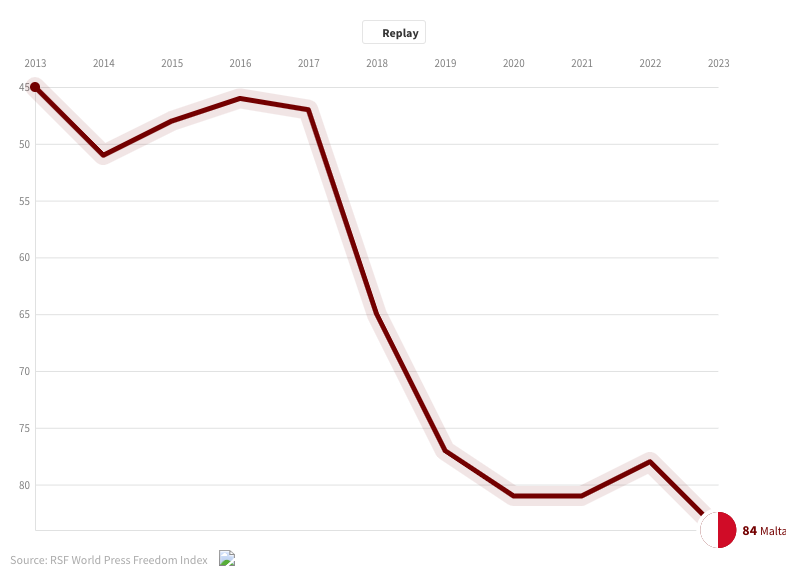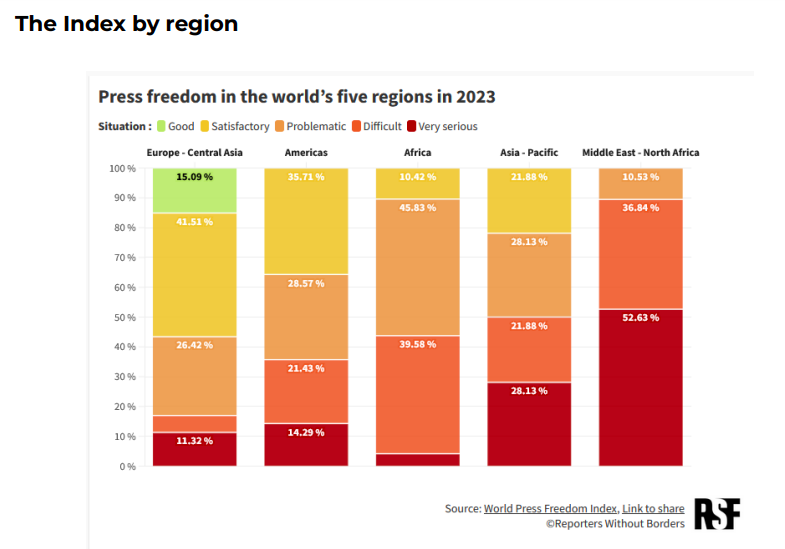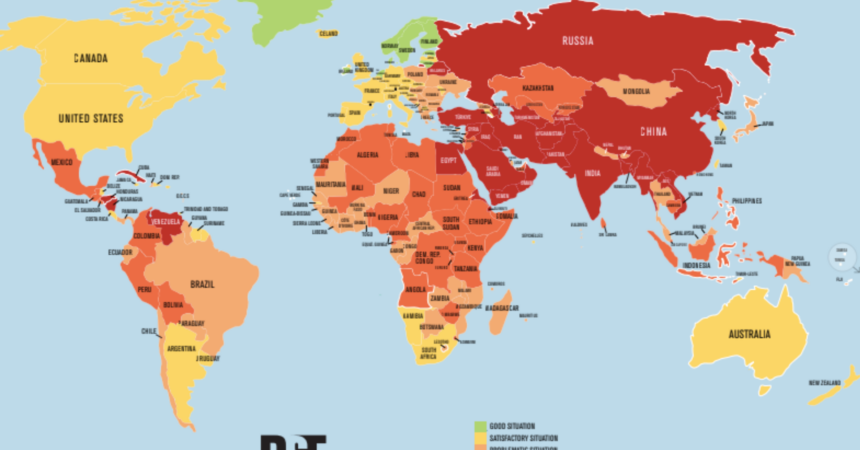The World Press Freedom Index by Reporters Without Borders (RSF) has recorded Malta’s lowest score yet, with the country dropping six places from last year’s ranking.
According to the international report published on Wednesday, Malta’s press freedom environment remains classified as “problematic”, and the country is now ranked 84 after an improved score of 78 last year. Malta now sits between Chile (83) and Guinea (85).
Since the Labour Party came into power in 2013, Malta’s press freedom ranking plummeted a staggering 36 places, from number 45 in 2013 to number 77 in 2019, and losing a further four places in 2020 placing the country at 81, a score that remained unchanged in 2021.

Malta’s press freedom rankings from 2013 onward. Source RSF Press Freedom Index
Among the factors contributing to the fall in ranking is the Maltese government’s failure to implement any of the recommendations made by the public inquiry board.
The only recommendation taken up by the authorities was the establishment of a committee of media experts to advise on press freedom reforms, but the legislative reform needed to protect journalists remains limited in scope.
Another significant development contributing to Malta’s worsening score is the government’s 40 Freedom of Information appeals filed by government entities against The Shift and the posthumous defamation lawsuits still targeting the family of Daphne Caruana Galizia.
Last year’s improvement was primarily due to the conclusions and recommendations of the Public Inquiry into the State’s role in the murder of journalist Daphne Caruana Galizia.
Malta is now penultimate among the EU 27 bloc, after Hungary (72) but before Greece (107).
Balancing freedom and security
The World Press Freedom Index, an annual report on the state of journalism in 180 countries, describes press freedom in Western Europe as characterised by a delicate balance between freedom and security. The war in Ukraine has also affected Western Europe, which often struggles to find a balance between security and freedom.
As a result, several countries have restricted the work of journalists on the grounds of ‘national security’. In Greece (107th), spying on journalists by the intelligence services and Predator spyware was the biggest violation of press freedom in the European Union in 2022, and this explains why Greece has the lowest ranking of any EU country in the 2023 index.
The war in Ukraine has allowed the Kremlin to undertake complete censorship and the forced exodus of independent Russian and foreign media outlets, thus creating space for the dissemination of coordinated propaganda by pro-government media. In Ukraine (79), the Kremlin’s propaganda machine deploys rapidly whenever new territory is conquered- TV channels are jammed, Ukrainian media are replaced, and local journalists are hunted down.
Despite these worrying issues, the differences in the rankings of EU Member States have narrowed considerably. There are twice as many EU members that have risen in the index than those that have fallen. Furthermore, the rise in the Index of most of the EU’s eastern members has been accompanied by a realisation that independent reporting can act as a bulwark against Kremlin propaganda.

A ‘bad’ situation in seven out of 10 countries
Beyond Europe, the Index highlights the rapid impact of the digital ecosystem’s fake content industry on press freedom. In 118 countries (two-thirds of the 180 countries assessed in the Index), most respondents to the Index questionnaire reported that political actors in their countries were frequently or systematically involved in massive disinformation or propaganda campaigns.
The index found the situation is “very bad” in 31 countries, “bad” in 42, “problematic” in 55, and “good” or “fairly good” in 52 countries. In other words, the environment for journalism is “bad” in seven out of ten countries and satisfactory in only three out of ten.
Norway is in first place for the seventh year running. In second place, Ireland (up four places to 2nd), ahead of Denmark (down one place to 3rd). The Netherlands (6) has risen 22 places, regaining the position it held in 2021 before the murder of crime reporter Peter R. de Vries.
There are also changes at the bottom of the index. The bottom three places are all occupied by Asian countries: Vietnam (178), which continues to hunt down independent reporters and commentators; China (down 4 to 179) remains the world’s biggest jailer of journalists and one of the biggest exporters of propaganda content; and, not surprisingly, North Korea (180th).
The World Press Freedom Index can be found here.













While much of what is written in this article reflects on the reality in Malta in regards to the present PL govt, there is one aspect which this report isn’t reflecting. The index is more related to the environment provided for journalists by the governments of the countries.
The anti-social impact people bring into and in reverse take from social media isn’t explicitly mentioned, but also important. The internet with its social media platforms is like a mirror and a place for practice for those who self-radicalised themselves via such sources and communities. The echo chambers they are locking themselves in are just furthering a toxic mindset and this isn’t to be contained to the virtual world. In countries where people take to the streets more often and in larger crowds, and the media is on spot to do its work, journalists have become exposed more to violence, directly by physical attacks to themselves and their equipment. All in the open and the attackers don’t even mind to act that way when filmed. Such incidents are prosecuted when reported to the police and also dealt with by the courts, but it hasn’t changed the mindset of the perpetrators at all.
The rise of populism and their agitators has in my opinion in some countries just as much impact on the work and safety of the lives of journalists, like oppressive dictatorial regimes. For those followers of populism, journalists who report the things as they are, as they witness them in the real world, are ‘disturbers’ of their self-knitted bubble and delusions, whether fed to them by their populist leaders and idols, or out of self-radicalisation. The State is challenged to tackle such developments, but in a country like Malta, where the governing party has joined the populism bandwagon itself, one can hardly expect anything from them.
Populists dispise people who think for themselves and air their critical thinking, and journalists are therefore considered as being ‘the enemy’. More so because they contravene the ideal and oft hatefilled worldview of populists that allows them to seduce and delude their followers. They have no sense of self-responsibility and no respect for the life and work of others who don’t think their ways.
Russia arrests foreign journalists. France and Malta had their journalists killed. The former by religious extremists, us because of corruption.
Well done Malta, the best in the EU if not the world.
ROBBER Abela and his public well lubricated propaganda machine does not seem to impress the international experts in the least.
The 40 SLAPP lawsuits against “THE SHIFT NEWS” alone redefined the level:
Above me the Basement.
The mere fact that press freedom in Ukraine is rated better than in Malta shows: It can only get worse next year.
Another medal Abela and his gang can hang on their chests.